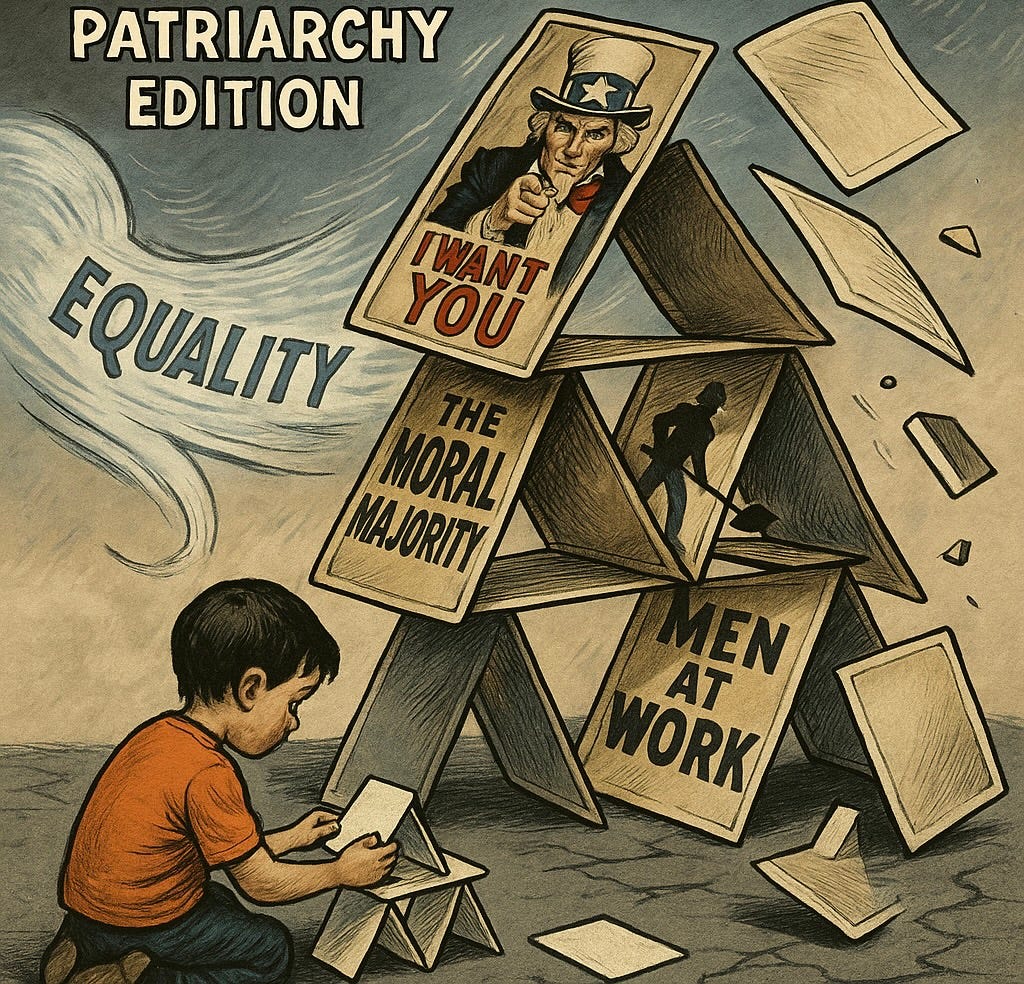
Heather Cox Richardson is one of America’s clearest minds, and I encourage everyone to follow her work. She’s been developing an idea lately that feels both familiar and urgent. One that has been simmering for generations and is now boiling over: that sexism, more than almost any other force, is shaping this American moment.
She’s right.
But sexism doesn’t act alone. It intertwines with race, class, and the media ecosystem that profits from our division. I want to linger on how the right-wing messaging machine, funded by billionaires and laundered through “patriotic” euphemisms, has accelerated male decline while weaponizing it for profit.
This isn’t about disparaging men or downplaying other identitarian hierarchies in race, ethnicity, religion, and sexual orientation. It’s about recognizing how language, power, and fear have been engineered to fracture our shared reality.
The Gender Earthquake
In the twenty-first century, we’re living through a gender inversion with few historical parallels. Men still dominate leadership positions and STEM fields. Still, there is a quieter story beneath the surface: women are now outperforming men in higher education, professional advancement, and measures of long-term stability. They’ve navigated a social landscape designed to exclude them, and learned how to win anyway.
Meanwhile, many men are struggling to adapt to a new economy that rewards collaboration, emotional intelligence, and executive functioning over brute strength or inherited status. This isn’t just economic; it’s existential. For generations, manhood was defined by indispensability, the idea that being male was your qualification. Now that the world no longer guarantees that privilege, the disorientation is profound.
The tragedy is that this disorientation could have been an opportunity for growth, for reimagining masculinity beyond domination, if not for the media machine that learned how to monetize insecurity.
The Rhetorical Inversion Machine
The modern right’s genius, and poison, lies in its ability to invert moral language. It didn’t just build a propaganda network; it rewired the nation’s vocabulary. “Freedom” became the right to dominate. “Patriotism” became loyalty to grievance. “Right to life” became the right to control.
This didn’t happen by accident. From the Powell Memo in the 1970s to today’s think-tank assembly lines, conservative strategists learned to turn moral terms into cudgels. They figured out that if you could make cruelty sound virtuous, and hierarchy sound natural, you could own the political imagination.
Language like “law and order,” “personal responsibility,” and “moral majority” created a fog of moral simplicity that blurred the actual debates: Who holds power? Who profits? Who gets to speak?
In this fog, the right sold resentment as common sense.
The Echo Economy
Today’s outrage industry has perfected what propaganda once only dreamed of: a fully automated feedback loop. Algorithms do what pamphlets never could. They find the angriest, most insecure voices, amplify them, and turn them into micro-celebrities. A young man, confused about his place in the world, now opens an app and is greeted with an infinite scroll of digital patriarchs promising that the problem isn’t the system but women, immigrants, minorities, and “wokeness.”
It’s not organic. It’s a supply chain. Billionaire donors fund pseudo-academic outfits that frame male alienation as divine design. Media empires package it into entertainment. Social platforms distribute it through algorithmic tribalism. Every click confirms the illusion of a brotherhood under siege, and every view funds the next outrage cycle.
The machine doesn’t just radicalize men. It harvests them.
It monetizes despair while pretending to solve it. It tells men feminists are robbing them while their wages stagnate, their unions collapse, and their political representatives cut the safety nets beneath them. It converts existential confusion into political capital, or a kind of digital feudalism in which emotion is tribute.
This is the authentic architecture of the echo economy: a system that turns grievance into engagement and engagement into profit. The anger feels righteous because it is real. But its purpose is to keep the user angry, not enlightened.
The Complicity of Yesterday’s Centrism
Here’s the part too few will admit: yesterday’s centrism helped build this monster.
By adopting the right’s framing — “identity politics,” “cancel culture,” “woke elites” — centrist commentators legitimized bad-faith narratives as reasonable disagreements. They worried about “alienating” male voters while never confronting the economic and emotional systems exploiting them. They mistook false balance for fairness, mistook “listening to both sides” for leadership.
This is the pundit’s version of codependency: “If we just don’t make him feel emasculated, maybe he won’t break the furniture.”
In trying to appear neutral, they laundered the right’s talking points through polite language. And that polite language has consequences: it narrows the boundaries of acceptable empathy. It tells women who’ve lost bodily autonomy that their pain is “divisive.” It tells queer people and racial minorities that their visibility is “too political.”
The center’s obsession with moderation becomes, in practice, a protection racket for extremism.
The War on Reality
The right’s messaging empire isn’t designed to win arguments; it’s intended to exhaust them. Flood the zone until people can’t tell the difference between disagreement and delusion. Keep everyone talking about tone while the house burns.
That’s why we end up debating absurdities, like whether feminism caused inflation, whether equality makes men “weaker,” or whether reproductive rights are moral “opinions.” It’s not that people believe these claims; it’s that disbelief itself runs out of oxygen.
Heather Cox Richardson has argued that sexism is the throughline of this moment, and I’d add that sexism has become the universal solvent for reason. It dissolves solidarity between working men and women, divides potential coalitions, and cloaks exploitation in the language of nature. It keeps us from seeing the real corrupting force: a machine that feeds on division and calls it democracy.
A Path Forward
If democracy is to survive this phase of algorithmic patriarchy, it needs a new civic language. One that can name the exploitation without falling into its rhythm. We can’t out-shout bad faith, but we can out-clarify it.
That means reclaiming moral words like freedom, work, family, faith, and security and restoring them to their democratic meanings. It means speaking to men not as threats to equality but as casualties of a system that taught them domination was destiny. It means naming racism, sexism, and homophobia as tools of management, not just moral failures.
Because the truth is, the machine doesn’t care who it consumes. It will devour men, women, and the republic itself if outrage continues to pay better than understanding.
We live in an echo economy that rewards noise and punishes reflection. A country where empathy is treated as malware and cruelty as common sense.
Men were told they were born to lead; now they are told the world stole their crown. Women were told equality would be shared prosperity; now they’re told it’s their fault for wanting too much. Everyone is angry, but no one is talking to each other. Instead, they’re talking through an algorithm that knows how to keep them apart.
That’s not politics.
That’s captivity.
The question now is whether we can learn to hear ourselves again, before the machine convinces us that silence is strength.






